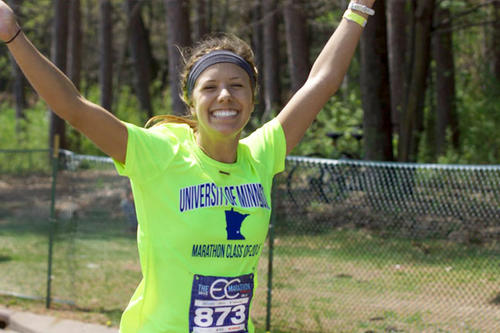
For students in Chris Lundstrom’s popular kinesiology course, all the hard work is worth it in the long run. They learn about physiology, nutrition, and mental strength, and they also get to cross “Run a Marathon” off the bucket list.
The course, “PE 1262: Marathon Training,” will be in its eighth year this spring. Although Lundstrom was recently an elite marathoner—he competed in the Olympic trials for Team USA in 2004, 2008, and 2012—most of his students are recreational runners, at best.
To qualify, they need to get a physical and their doctor’s permission, plus be able to run two miles. The rest takes care of itself over the course of the semester.
“It’s not about time, it’s about being committed and determined,” says Lundstrom, a Ph.D. grad in kinesiology at the U. “If they show up on Sundays for the long run, they’ll be ready.”
That may be an understatement. To date, 528 students have taken the final test—an early-May marathon in Eau Claire. Of those, a whopping 525 (99 percent) finished, and the three who didn’t were victimized by an early heat wave this past spring.
Running and research
But the class is about more than setting goals 26.2 miles in the distance. It’s also about science and research. Students visit a lab before they start training and again a couple of weeks before the marathon, and are tested for body composition and oxygen utilization.
“It allows us to help them train better,” says Lundstrom. “It also gives us data as to what happens within this 20-week program—what changes occur [to the students’ bodies].” This and other data are used by faculty and graduate students at the U as they study everything from physical rehabilitation to sports psychology.
The course is a win for research—and for students’ psyches. Many of them have stayed in touch with Lundstrom over the years, bonding over a course and a challenge that they conquered together.
“It’s a life-changing thing for a lot of students to be able to accomplish a goal like that, one they might have thought was unreachable,” he says. “Hopefully, the lessons they learn in terms of commitment and determination pay off in other areas later in their lives.”
- Categories:
- Education





